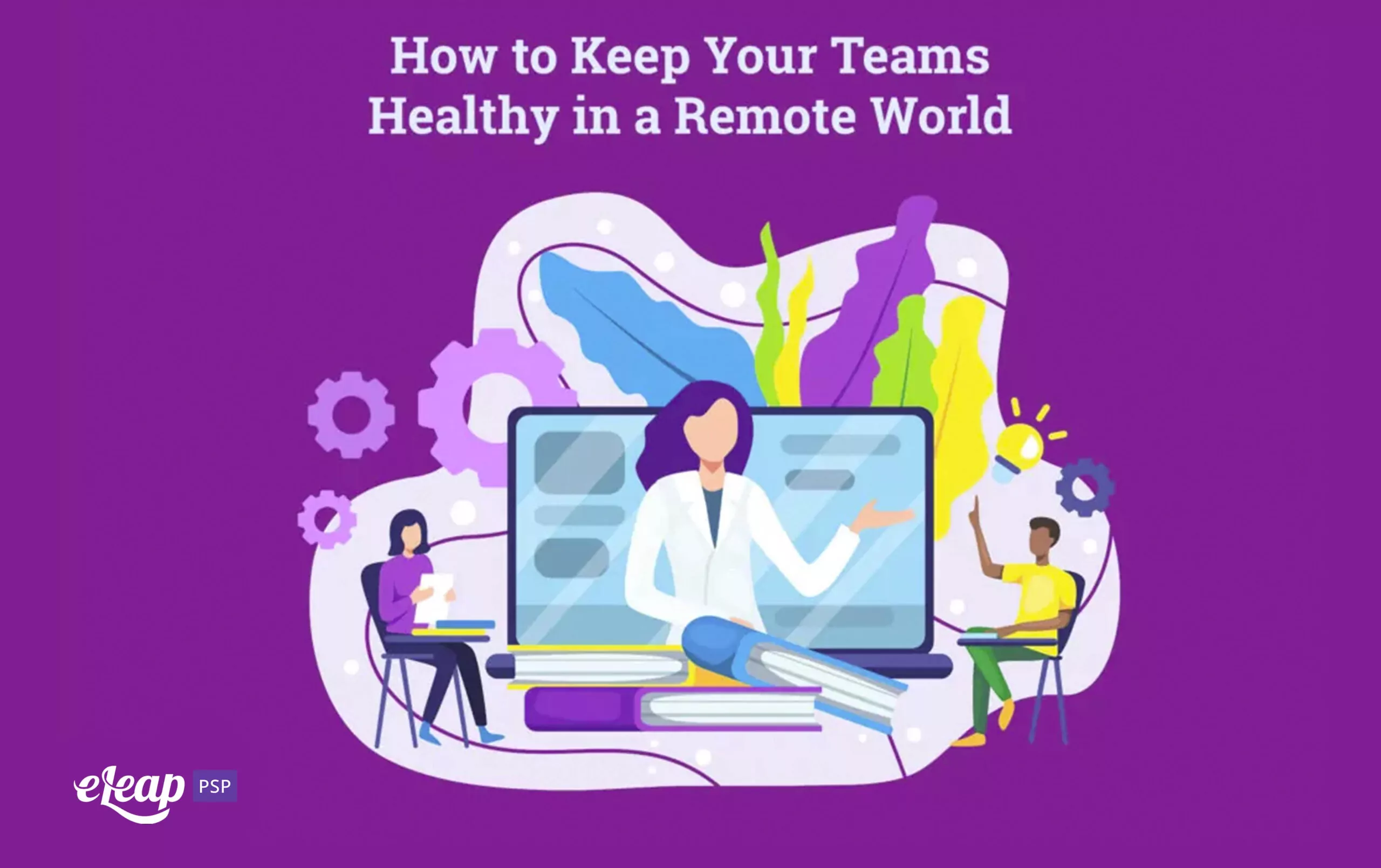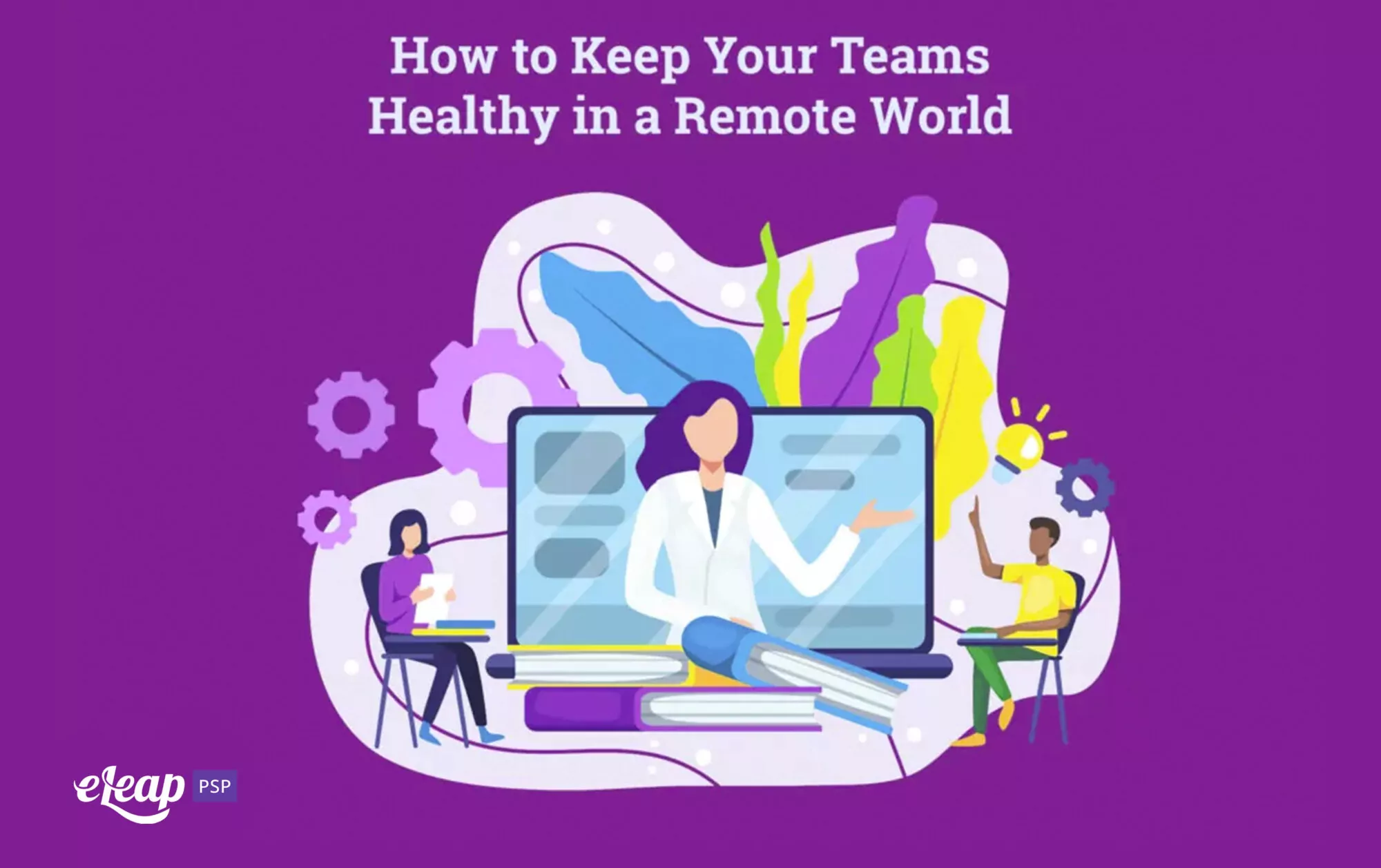How to Keep Your Teams Healthy in a Remote World

When we talk about health these days, COVID-19 is the assumed focus of the discussion. Sadly, that means many other issues go undiscussed and unnoticed. A critical part of modern performance management is ensuring that your people are healthy enough to perform their duties in the first place.
That means doing more than just providing information and education about the coronavirus, or what do to if they feel that they or a loved one might be infected. In this post, we’re going to look at some of the things that you need to do to keep your teams healthy in a remote world.

Why Does It Matter?
First, let’s address a common question: why does it even matter? What is a manager’s responsibility when it comes to an employee’s health?
Actually, according to a study conducted by Gallup, physical health is one of five critical factors that goes into individual well-being and affects job performance and even employee retention. While we’re not advocating that you be intrusive here, you must provide your employees with help and guidance when it comes to staying healthy in a world that feels like it’s been turned upside down.
So, what can you do? How should you support your remote teams and encourage them to stay healthy?
Sleep Matters
Sleep is one of those health factors we tend to overlook. Our whole society is built on the idea that sleep doesn’t matter. Burning the midnight oil, sleep is for the weak, I’ll sleep when I’m dead – those are just some of the ways that we denigrate the need for and importance of sleep.
Make no mistake – sleep is absolutely critical to our physical and mental health. While we like to pretend that we’re strong and don’t need it, the truth is that even a few hours’ sleep deficit reduces our cognitive abilities, leads to lower levels of productivity, and even affects our cardiovascular and mental health.
Overcoming the sleep stigma is simple enough. There are reams of scientific literature, clinical studies, and other evidence that can be used. However, how do you get more, high-quality sleep in a time when stress levels are shooting through the roof? There are a few things you can try, including the following:
- Offer access to sleep tip sheets and guides that explore how to create an environment conducive to sleep.
- Require workers to set schedules and log off computers well ahead of bedtimes to help them get work out of their heads.
Make Breaks a Big Deal
We’ve all been there before. You sit down at the desk to start working on something, and the next time you glance at the clock, it’s been hours. Your body is tense, your neck stiff, your brain fuzzy. That’s no way to improve productivity, and it can lead to some serious health issues if left unchecked.
To help combat our tendency to work, work, work, make breaks a big thing. Encourage your team members to take regular breaks each hour. Consider suggesting something like working for 25 minutes, then walking for five, or working for 45 minutes, and taking a break for 15.
It’s not just hourly breaks that we need. We also need sustained time away from our devices and our tasks. Lunch breaks are easy enough to ignore in an in-office situation. How much easier do you think it is to skip lunch day after day when working at home in the name of productivity, or because an employee feels overwhelmed?
Encourage your people to take a full lunch break every day. One way to do that is to have group lunches via Zoom. This can combine show-and-tell with an off-hours get-together, building social bonds and helping people reconnect with one another while simultaneously offering the break from work our minds and bodies need.
Provide Health Information
When we’re trapped in our routines, our minds get stuck in a rut. Often, we don’t even realize that we’re not thinking about anything other than work, a particular project, or a specific stressor. While we’re hyper-focused on those things, physical and mental health goes out the window. That effect is amplified during times like the present when lockdown has changed reality for so many. You can help by providing regular health-related information, reminders, and the like.
What does that mean, though? It could be something as simple as including a health tip in your weekly newsletter. Or, you could make it part of your weekly check-ins with each employee, or even integrate it into your daily group meetings or weekly company-wide Zoom or Teams meetings.
What information should you provide? Mix it up! One time you might discuss the benefits scientists are finding with plant-based diets, and the next touch on low-impact cardio exercises like walking. You can provide healthy cooking tips, guides for employees struggling to get physically active – the sky’s the limit.
The point here is to provide not just information and guidance, but a reminder to your team members that there’s more to life than lockdown and work, and that their bodies and minds will perform better when they care for them.
Make Health Appointments Free Time
Some employees may feel that they cannot take time away from work to handle medical or dental appointments. The thought of taking a little of their PTO for something like that can lead to feeling overwhelmed and stressed. You can help by offering unlimited time off for anything related to a medical or dental appointment.
A Healthy Team Is a Productive Team
The point of all this information is simple – a healthy team is a productive team. If your employees are healthy, engaged, and feel supported to live their best lives, they’re more productive. Performance rises across the board, the business performs better, you reduce employee-related churn and save money. It’s amazing what a simple step like promoting health to your team members can achieve.